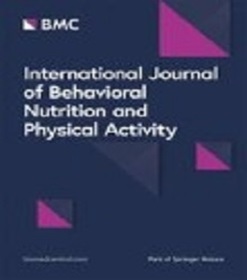Do calorie labels change energy purchased in a simulated online food delivery platform? A multi-arm randomised controlled trial
IF 5.6
1区 医学
Q1 NUTRITION & DIETETICS
International Journal of Behavioral Nutrition and Physical Activity
Pub Date : 2024-09-17
DOI:10.1186/s12966-024-01638-y
引用次数: 0
Abstract
As rates of obesity and overweight continue to increase in the UK, calorie labels have been introduced on menus as a policy option to provide information to consumers on the energy content of foods and to enable informed choices. This study tested whether the addition of calorie labels to items in a simulated food delivery platform may reduce the energy content of items selected. UK adults (n = 8,780) who used food delivery platforms were asked to use the simulated platform as they would in real life to order a meal for themselves. Participants were randomly allocated to a control condition (no calorie labels) or to one of seven intervention groups: (1) large size calorie labels adjacent to the price (LP), (2) large size label adjacent to the product name (LN), (3) small label adjacent to price (SP), (4) small label adjacent to product name (SN), (5) LP with a calorie label switch-off filter (LP + Off), (6) LP with a switch-on filter (LP + On), or, (7) LP with a summary label of the total basket energy content (LP + Sum). Regression analysis assessed the impact of calorie labels on energy content of foods selected compared to the control condition. The mean energy selected in the control condition was 1408 kcal (95%CI: 93, 2719). There was a statistically significant reduction in mean energy selected in five of the seven intervention trial arms (LN labels (-60 kcal, 95%CI: -111, -6), SN (-73, 95%CI: -125, -19), LP + Off (-110, 95%CI: -161, -57), LP + On (-109, 95%CI: -159, -57), LP + Sum (-85 kcal, 95%CI: -137, -30). There was no evidence the other two conditions (LP (-33, 95%CI: -88, 24) and SP (-52, 95%CI: -105, 2)) differed from control. There was no evidence of an effect of any intervention when the analysis was restricted to participants who were overweight or obese. Adding calorie labels to food items in a simulated online food delivery platform reduced the energy content of foods selected in five out of seven labelling scenarios. This study provides useful information to inform the implementation of these labels in a food delivery platform context.卡路里标签是否会改变模拟在线食品配送平台中的能量购买?多臂随机对照试验
随着英国肥胖率和超重率的持续上升,作为一项政策选择,在菜单上引入了卡路里标签,为消费者提供有关食品能量含量的信息,帮助他们做出明智的选择。本研究测试了在模拟食品配送平台中的食品上添加卡路里标签是否会降低所选食品的能量含量。使用食品配送平台的英国成年人(n = 8780)被要求像在现实生活中一样使用模拟平台为自己订餐。参与者被随机分配到对照组(无卡路里标签)或七个干预组中的一组:(1)大尺寸卡路里标签与价格相邻(LP);(2)大尺寸标签与产品名称相邻(LN);(3)小标签与价格相邻(SP);(4)小标签与产品名称相邻(SN);(5)带有卡路里标签关闭过滤器的LP(LP + Off);(6)带有开启过滤器的LP(LP + On);或(7)带有菜篮子总能量含量汇总标签的LP(LP + Sum)。与对照组相比,回归分析评估了卡路里标签对所选食物能量含量的影响。对照组所选食物的平均能量为 1408 千卡(95%CI:93,2719)。在七项干预试验中,有五项(LN标签(-60千卡,95%CI:-111,-6)、SN标签(-73,95%CI:-125,-19)、LP + Off标签(-110,95%CI:-161,-57)、LP + On标签(-109,95%CI:-159,-57)、LP + Sum标签(-85千卡,95%CI:-137,-30))所选择的平均能量在统计学上有显著降低。没有证据表明其他两种情况(LP(-33,95%CI:-88,24)和 SP(-52,95%CI:-105,2))与对照组不同。如果只对超重或肥胖的参与者进行分析,则没有证据表明任何干预措施产生了效果。在模拟在线食品配送平台中为食品添加卡路里标签,可降低七种标签情况中五种情况下所选择食品的能量含量。这项研究提供了有用的信息,为在食品配送平台中实施这些标签提供了参考。
本文章由计算机程序翻译,如有差异,请以英文原文为准。
求助全文
约1分钟内获得全文
求助全文
来源期刊
CiteScore
13.80
自引率
3.40%
发文量
138
审稿时长
4-8 weeks
期刊介绍:
International Journal of Behavioral Nutrition and Physical Activity (IJBNPA) is an open access, peer-reviewed journal offering high quality articles, rapid publication and wide diffusion in the public domain.
IJBNPA is devoted to furthering the understanding of the behavioral aspects of diet and physical activity and is unique in its inclusion of multiple levels of analysis, including populations, groups and individuals and its inclusion of epidemiology, and behavioral, theoretical and measurement research areas.

 求助内容:
求助内容: 应助结果提醒方式:
应助结果提醒方式:


